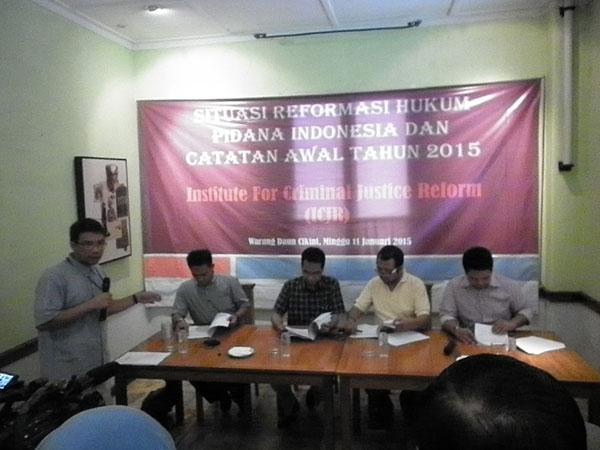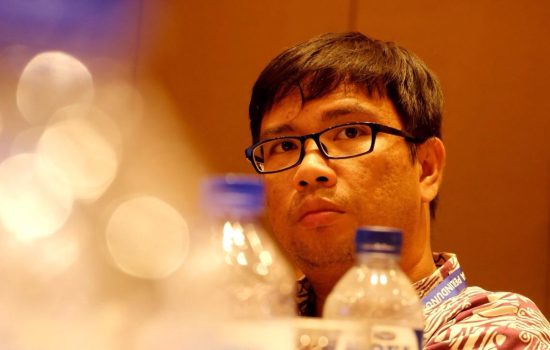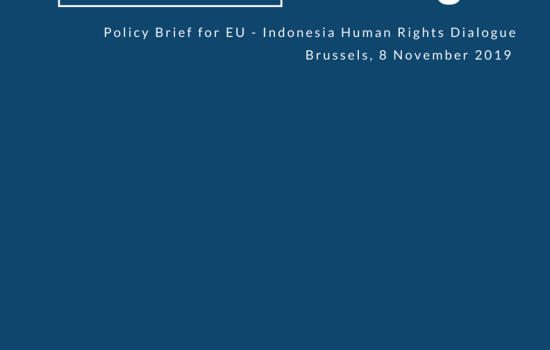- General Overview on Indonesia Criminal Law Reform 2014
Early 2013, the government finally submitted two crucial legislation, namely the Draft Bill on Criminal Code (RKUHP) and Draft Bill on Criminal Procedural Law (RKUHAP) to the House of Representatives. These draft bills could be the legislation that transform the criminal justice system and criminal law in Indonesia, by giving more emphasis on human rights protection.
However, the discussion on both draft bills at the House was suspended due to the general election in 2014. This situation was crucial, as the general election chose the new president and vice president, including lawmakers at the national and regional level.
By the end of 2014, the government via the National Development Planning Agency (Bappenas) issued a recapitulation list of Medium Term Regulatory Framework 2015-2019 and regulation program for 2015. The Institute for Criminal Justice Reform (ICJR) sees that there are 21 laws and regulations related to criminal law and criminal justice system reform.
Some of those draft bills are RKUHP, RKUHAP, amendment to Corruption Law, draft bill on asset recovery, draft bill on cash transaction limitation, and also implementing regulations such as government regulation implementing the Law on Juvenile Justice System (SPPA Law).
In terms of criminal law reform, the legislation program that have been planned has been long overdue, ever since the President Yudhoyono came into power. Most of the legislation that will be prioritized in 2015 are not too different with the ones in 2014. Not to mention that the government has many homeworks, especially in issuing implementing regulations.
Unfortunately, the government failed to include some other important draft bills, such as the Ratification to the Rome Statute, Ratification to the Convention for the Protection of All Persons from Enforced Disappearance, Draft Bill on Antitorture, and Ratification to Optional Protocol to the Convention Against Torture (OPCAT), all of which are important to continue the criminal law reform in Indonesia.
Criminal law reform, especially the effort in emphasizing human rights protection, are not showing any progression. For instance, the overcapacity issue in correctional facilities and detention houses, are routine problem that never be solved since forever.
The issue on capital punishment is also highlighted for the criminal law reform. Debate on this issue revolves on those who support death penalty and those who are not, while in fact this type of punishment is still stipulated under KUHP.
On the other hand, the Attorney General Office (AGO) and the Supreme Court are not paying attention to the procedural law of those that are facing capital punishment. ICJR assumes that the reason why the AGO is reluctant to execute the capital punishment is due to the burden of proof that satisfies the “beyond reasonable doubt” principle. This is related to the prudentiality of investigator, prosecutor, and the judges in implementing procedural law for accused that are facing capital punishment.
In regards to defamation by using internet, the overcriminalizing attitude from the government is still heavily criticized. Article 27 (3) of Law No. 11 on 2009 on Electronic Information and Transaction (IT Law), is still the center of criticism by Indonesian internet users. Since 2009, the Minister of Communication and Informatics promised to revise the IT Law, that probably will not be realized in 2015.
Rudiantara, the new Minister of Communication and Informatics, also said in November 2014 that there is no significant problem about the IT Law. The fact says otherwise, in which there are five cases during 2014 that related to the internet, and only two of them that were acquitted by the court.
Many legislation also stipulating criminal sanction outside KUHP, in which the jail time exceeds 5 years of imprisonment. Due to this situation, it will correlate with the numbers of crimes that are subject to detention. Besides criminal sanction under KUHP, there are 443 crimes up until 2007 that are subject to more than 5 years of imprisonment. This brings to the fact that are more people that are detained, as the legal aspect will be the main consideration for law enforcers. In addition, the easy requirements in detaining a person is also the main reason why the numbers of detained persons are increased.
During 2014, the number of torture cases are relatively high. There are 36 cases with strong allegation of torture, including inhuman or degrading treatment. Based on the report received by the National Commission of Human Rights (Komnas HAM), the National Police is at the first place as the institution that allegedly torture and violence, and the number of it is at the phase of investigation and examination process. The reason to obtain confession is dominating the modus operandi of torture. Up until now, law enforcement is considerably low, as most of the perpetrators of these cases are protected by their own institutions.
Specific to legal aid, while it is guaranteed under the Constitution, KUHAP, and the SPPA Law, it is difficult to be implemented. One of the many reasons is the availability of lawyers, who are currently not capable of reaching all Indonesian regions. Even with the Law on Legal Aid, lawyers availability for legal aid is still the major problem. Legal aid organizations that have been accredited by the National Law Development Agency (BPHN), are mostly located in Java Island. Without ensuring lawyers availability, guaranteeing rights for suspect/accused during the criminal proceeding will be difficult. If the suspect has no access to the necessary legal aid, he/she will be vulnerable to arbitrary action from investigator, prosecutor, even the judicial institution. In addition, their ability to conduct defense will also be minimized.
Regarding the KUHP reform, the heaviest criticism is addressed to the Second Book of RKUHP on Crimes. The criticism based on the fact that excessive protection to the state interest and harming many individual interest, which is evident from the type of crimes, criminalization policy, and also duplication, qualification, and gradation of crimes. Criticism towards the codification policy is also present, as such effort is not benefiting anymore when prosecuting special crimes. For instance, the incorporation of corruption and money laundering under RKUHP codification.
In terms of KUHAP reform, the discussion of RKUHAP at the House during 2014 was finally terminated. This is somewhat a relief, due to the fact that the discussion is not showing the expected quality. The attendance of lawmakers is terribly low, and even did not meet the quorum. The discussion process was not involving the public participation, and at the same time lack of transparency due to difficulties in obtaining necessary documents such as problems inventory list (Daftar Inventaris Masalah), because the House saw it as state secret document.
The last issue that is most concerning is the issuance of Qanun Jinayat in Aceh, which was issued on 27 September 2014 by the Aceh Representative Council and applies to both moslem and non-moslem. The form of punishment (caning) under this legislation is inhuman and degrading, while also violating the Convention against Torture and Other Cruel, Inhuman or Degrading Treatment or Punishment that has been ratified by Indonesia. The problem lies when caning is imposed to petty crimes such as selling food during fasting period, wrong dresscode, dating in certain places. Other than that, no clear provision regarding legal aid for those that facing caning. The implementation of sharia law under Wilayatul Hisbah (WH), is also discriminative, using violence, and gender biased.
- Recommendation for 2015
Based on the criminal law reform in 2014, there are some recommendations from Institute for Criminal Justice Reform (ICJR) for the government, House, and Supreme Court.
First, it is important for the AGO to differentiate perpetrator that only committing crime for the first time. For this type of perpetrator, the AGO must optimize the fine, and therefore the Supreme Court may impose fine according to Supreme Court Regulation No. 2 of 2012. In addition, ICJR also recommends that narcotics perpetrators must be indicted with rehabilitation instead of imprisonment.
Second, the effort in building new correctional facilities and detention houses will not minimize the number of detainees and inmates. Therefore, pretrial detention must be prevented, and ICJR strongly recommends to use house or city arrest. It is should be conducted to significantly reduced the number of detainees and inmates at correctional facilities and detention houses. ICJR also asks the Supreme Court and judicial institutions below it to impose probation or pidana bersyarat (Article 14 of KUHP) for those who commit the crime the first time.
Third, in regards to capital punishment, ICJR encourages all parties to erase it. For the short-term period, it is important for the government to pay more attention on the procedural law in capital punishment cases. Suspects that are facing capital punishment may not be examined without his lawyer’s presence. The government must ensure high standards, such as video recording during examination, may not detain them in places other than Detention Houses organized by the Ministry of Law and Human Rights, ensure that there is no violation to the procedural law, and every evidence must be legal.
Fourth, regarding case review (peninjauan kembali), ICJR encourages the Supreme Court to revoke Circular Letter No. 7 of 2014, and at the same time the Supreme Court must issue a Supreme Court Regulation on Procedural Law on Case Review, which will stipulate the step-by-step procedure for case review, including novum (new evidences). ICJR asserts that case review may not be limited, as long as it is regaring novum that is filed by the convicted and/or their heir. The government must also issue a government regulation on compensation for convicted that has been killed in a death penalty, if later on the Supreme Court decided that he/she is not guilty.
Fifth, ICJR recommends the government to revise the IT Law, especially the provisions that already regulated under KUHP. Specific to defamation, the government and House must revoke this provision from the Indonesian criminal law. The National Police and the AGO must not conduct detention for defamation cases. In addition, the Supreme Court must not imposing imprisonment for defamation cases, instead fines or probation period is more suitable for defamation cases.
Sixth, regarding the pretrial detention, ICJR recommends that investigator and prosecutor to use alternative non-custodial measure, by implementing house or city arrest. ICJR also encourage for the establishment of a more transparent and accountable bail system, for suspension of detention. In addition, ICJR also recommends the Supreme Court to optimize the role of pretrial, by issuing Supreme Court Regulation on Pretrial Procedural Law.
Seventh, in terms of torture during investigation, ICJR recommends the government and the House to ratify OPCAT immediately and also discussing the Draft Bill on Anti Torture. ICJR also encourages the Supreme Court to issue Circular Letter, which prohibits the use of evidences that obtained from torture. ICJR recommends the government to bring torture perpetrators before the court, and not merely examined in terms of code of ethics violation.
Eighth, to ensure the right to legal aid, ICJR recommends that the government should facilitate the equal distribution of lawyers throughout Indonesia, by cooperating with the bar association. The government must ensure the lawyers and legal aid availability, at least in all district courts. Legal aid must also be provided for suspects that categorized as underprivileged, facing more than 5 years of imprisonment. Indictment from the prosecutor may not be accepted by the judicial institution, if the suspect is not accompanied by a lawyer since the beginning of investigation.
Ninth, specific to RKUHP and RKUHAP, ICJR recommends that the government and the House to enable public participation in the discussion. Some of the provisions under RKUHAP must be re-arranged, while codification under RKUHP must be reconsidered. ICJR is of the view that codification will create massive problem, especially the criminalization policy.
Tenth,related to Qanun Jinayat, ICJR recommends the government, in this case the Minister of Interior Affairs, to conduct a public examination over the provisions of the qanun, by inviting academicians and criminal law expert, to review whether the qanun is in contradiction with laws and regulations. The Minister of Interior Affairs must also consistent in implementing human rights regulations to review the said qanun, such as ICCPR; Convention against Torture and Other Cruel, Inhuman or Degrading Treatment or Punishment; Convention on the Rights of the Child; Convention on the Elimination of All Forms of Discrimination against Women; and other international conventions that have been ratified by Indonesia.




![[RILIS KOALISI] Omong Kosong Reformasi Polri: Kepolisian Justru Menambah Sendiri Kewenangan Melalui Aturan Internal yang Menyimpangi KUHAP dan Melegitimasi Kekuatan Berlebih](https://icjr.or.id/wp-content/uploads/elementor/thumbs/PERKAP_NOMOR_4_2025_TENTANG_PENINDAKAN_AKSI_PENYERANGAN_TERHADAP_KEPOLISIAN_NEGARA_REPUBLIK_INDONESIA__STEMPEL_-1-1-rclr6vi1x3xico1naipvubrlblg9fbbhwvtzbgjfvw.png)